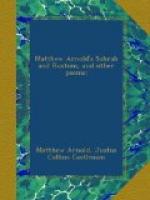Arnold has illustrated, with remarkable success, his ideas of that unity which gratifies the poetical sense, and has approached very close to his Greek models in numerous instances; most notably so in his great epic or narrative poem, Sohrab and Rustum, which is dealt with elsewhere in this introduction. Perhaps we could not do better than to quote for our consideration at this time, a fine synthesis of Mr. Arthur Galton. He says: “In Matthew Arnold’s style and in his manner, he seems to me to recall the great masters, and this in a striking and in an abiding way.... To recall them at all is a rare gift, but to recall them naturally, and with no strained sense nor jarring note of imitation, is a gift so exceedingly rare that it is almost enough in itself to place a writer among the great masters; to proclaim that he is one of them. To recall them at all is a rare gift, though not a unique gift; a few other modern poets recall them too; but with these, with every one of them, it is the exception when they resemble the great masters. They have their own styles, which abide with them; it is only now and then, by a flash of genius, that they break through their own styles, and attain the one immortal style. Just the contrary of this is true of Matthew Arnold. It is his own, his usual, and his most natural style which recalls the great masters; and only when he does not write like himself, does he cease to resemble them.... No man who attains to this great style can fail to have a distinguished function; and Matthew Arnold, like Milton, will be ‘a leaven and a power,’ because he, too, has made the great style current in English. With his desire for culture and for perfection, there is no destiny he would prefer to this, for which his nature, his training, and his sympathies, all prepared him. To convey the message of those ancients whom he loved so well, in that English tongue which he was taught by them to use so perfectly;—to serve as an eternal protest against charlatanism and vulgarity;—is exactly the mission he would have chosen for himself.... The few writers of our language, therefore, who give us ’an ideal of excellence, the most high and the most rare,’ have an important function; we should study their works continually, and it should be a matter of passionate concern with us, that the ‘ideals,’ that is, the definite and perfect models, should abide with us forever.” The Greeks recognized three kinds of poetry,—Lyric, Dramatic, and Epic. Arnold tried all three. First, then, as a lyricist.




